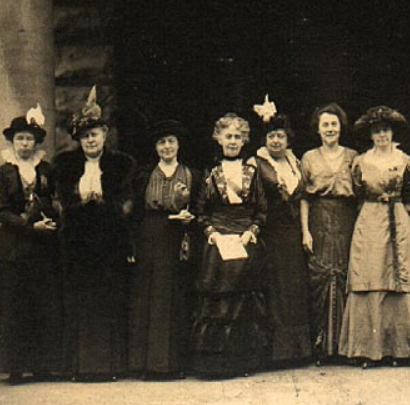
Wisconsin Women and Suffrage
On June 10, 1919, Wisconsin became the first to ratify the 19th Amendment allowing for women's suffrage, or the right to vote.
For over 70 years, many Wisconsin women and men fought for women’s suffrage, or the right to vote. While their attempts to add a suffrage amendment to the state constitution failed, they would succeed in ensuring Wisconsin was the first state to ratify the 19th Amendment, allowing women to vote in the US. Wisconsin ratified the amendment on June 10, 1919, and full ratification in the US was won on August 26, 1920. To learn more about the fight for women’s suffrage in the US, please see Women’s Suffrage in the United States: A Centennial Resource Guide.
While this was a significant event in Wisconsin’s history, it is essential to remember that the movement was often complicated and fraught with division. Not all suffragists agreed upon the methods to achieve their goals; some were more radical than others. Some placed the needs of white women above those of African American men and women; both racism and classism were issues in the movement.
Even after the 19th Amendment was fully ratified in 1920, many women of color across the US experienced barriers when exercising what should have been their right. While not all were experienced in Wisconsin, barriers were set up in states across the country to make it harder for people of color, immigrants, and people in poverty to vote. For example, poll taxes, or fees required to be paid before voting, were required in 1890 to keep African Americans from the polls. Literacy tests were used to disqualify some immigrants, poor, undereducated, or Black and Latine voters at least until the Voting Rights Act of 1965. Citizenship requirements varied for different groups and changed over time, thus excluding Asian American and Native American women from voting for decades after the 19th Amendment was passed. Even though white suffragists took inspiration from the status of women in many Native American communities, many did not fight for Native women — or other women of color — to be included under the 19th Amendment.
People from all backgrounds were involved in Wisconsin’s fight for suffrage, and for decades, the state was considered a laboratory for progressive voting rules. It’s important to celebrate the successes, learn from the mistakes, and continue addressing the inequities some still face today. This page is dedicated to the Wisconsin women who fought tirelessly to achieve the right to vote. Some of these women are listed below; even more will remain unrecorded or lost in archives, but we honor their work and sacrifices.
- Franzisca Mathilde Anneke (Annetke)
- Emma Curtiss Bascom
- Meta Schlichting Berger
- Reverend Olympia Brown
- Carrie Chapman Catt
- Clara Bewick Colby
- Crystal Eastman (Benedict)
- Zona Gale
- Helen H. Haight
- Ruth Hamilton
- Jessie Jack Hooper
- Carrie Horton
- Ada James
- Rachel Szold Jastrow
- Belle Case La Follette
- Susan Miller Quackenbush
- Lutie Stearns
- Mary Swain Wagner
- Laura Ross Wolcott
- Theodora Winton Youmans
LEARN MORE
Click on the links in the text above and see the bibliographies below for more information.
Strand, Karla J. Black Women and Suffrage in the US: A Centennial Resource Guide. Office of the Gender and Women’s Studies Librarian. Madison, WI: University of Wisconsin-Madison, 2019. https://www.library.wisc.edu/gwslibrarian/bibliographies/black-women-and-suffrage-in-the-us/
Strand, Karla J. Women’s Suffrage in the United States: A Centennial Resource Guide. Office of the Gender and Women’s Studies Librarian. Madison, WI: University of Wisconsin-Madison, 2019. https://www.library.wisc.edu/gwslibrarian/bibliographies/womens-suffrage-in-the-us-a-centennial-resource-guide/
Strand, Karla J. Women’s Suffrage in Wisconsin: A Centennial Resource Guide. Office of the Gender and Women’s Studies Librarian. Madison, WI: University of Wisconsin-Madison, 2018. https://www.library.wisc.edu/gwslibrarian/bibliographies/womens-suffrage-in-wisconsin-a-centennial-resource-guide/
Profile written by Karla J. Strand, Gender and Women’s Studies Librarian.
Photo courtesy of the Wisconsin Historical Society archives, Image ID: 100039.